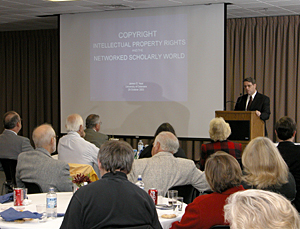

UDaily is produced by the Office of Public Relations
150 South College Ave.
Newark, DE 19716-2701
(302) 831-2791
|
 |
Expert urges faculty to get involved in 'intellectual property wars'
5 p.m., Oct. 29, 2003--Campuses of the future could feature academic journals paid for by the contributors instead of the consumers, an expert on intellectual property told the University Faculty Forum Tuesday, Oct. 28, in the Perkins Student Center.
 |
| James G. Neal, vice president for information services and university librarian at Columbia University, addresses the University Faculty Forum. |
James G. Neal, vice president for information services and university librarian at Columbia University, said we are living in the most active period in history for intellectual property law, and extensive changes are possible, depending on how court cases and commercial ventures unfold.
Music services that offer downloads for a dime or tightened standards for academic use of copyrighted material could be staples of the future, Neal said.
He asked forum listeners to get involved in the “intellectual property wars’’ swirling around such issues as open archives, authors’ rights, changing user guidelines, encryption, content manipulation, access, fair use standards and the gaps between European copyright laws and British-American copyright laws.
Encouraging forum participants to take an active role, Neal pointed out that he was the only librarian in Annapolis when Maryland legislators debated copyright law changes, but there were dozens of publishing lobbyists on hand.
With sweeping changes such as satellite communication, personal computing, encryption, e books and file sharing driving new legal rulings, Neal said, copyright has moved from law books to the front pages of daily newspapers.
“If we don’t defend academic values through the intellectual property wars, then educational and scholarly access to information will be eroded, and our academic values will be undermined,’’ Neal said.
Courts are revisiting fair-use standards and could limit use of copyrighted works for educational purposes, Neal said. Case law is still evolving.
Universities are in a unique position in the copyright wars, he said, because they are not just consumers of information; they are also producers of information.
Neal said universities may need to consider new business models for many of the products and services that we take for granted —including scholarly journals that can cost as much as $20,000 for an annual subscription, university-published books with expensive limited printings, and music downloads.
Some schools are already negotiating for campuswide access to music download services at prices of 99 cents a download to deter students from illegally copying songs, he said, adding that it would be more likely to work if prices came down to about 10 cents per song.
Universities are faced with increasing demand from students and faculty who have an “ATM philosophy” toward information—they expect self-service access, convenience, content and low cost, Neal said. Universities also are studying how to create repositories that will open archives for educational purposes.
Neal said other copyright issues are being negotiated on campuses. There is, for example, a tug-of-war between the American Association of University Professors and the Association of American Universities over who owns the rights to online courses and articles produced by university employees.
At Columbia University, Neal provides support for academic computing throughout a system of 22 libraries. He also works with the Electronic Publishing Initiative at Columbia, the Center for Research in Information Access and the Columbia Center of New Media Teaching and Learning.
Article by Kathy Canavan
Photo by Kathy Atkinson
 E-mail this article
E-mail this article
To learn how to subscribe to UDaily, click here.
|
 |

|

